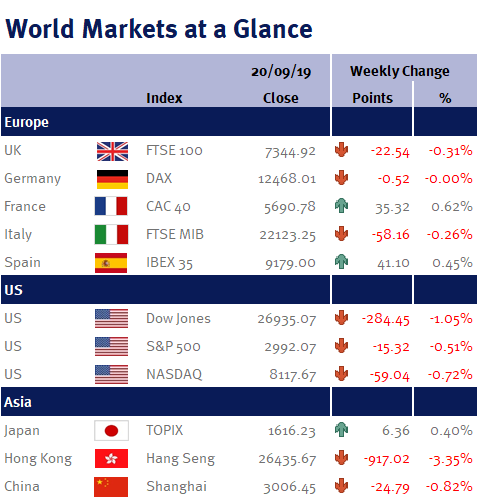Oil was of course the main focus at the start of the week after last Sunday’s (15 September 2019) drone attack on Saudi Arabia’s oil facilities which took out half of their oil production (roughly 5.7m barrels a day), which is around 5% of the total daily global supply.
Week ending 20th September 2019.
23rd September 2019

While the attack sent the price of crude oil sharply higher on Monday (16 September 2019), it was important to note that even at the highs of the day (just shy of $70 per barrel), Brent was only back to the level it was at the end of May 2019.
However, news on Wednesday (18 September 2019) that Saudi Arabia had already restored around half the oil production it had lost and that output will be returned to pre-attack levels by the end of September quickly pulled the rug out from under oil price!
This is positive as higher oil prices could have exacerbated the global economic slowdown we are currently experiencing (as higher oil prices are like an additional tax on our incomes and thus a headwind to economic growth).
Also on Wednesday, the Fed cut US interest rates by 0.25% to a range of 1.75%-2.00%. Although the move was widely expected, we were surprised and disappointed by how hawkish the accompanying statement was (policymakers appear reluctant to cut interest rates further believing the US economy is solid, with the ‘dot-plot’ suggesting no more cuts this year or 2020 and higher US interest rates in 2021 and 2022). Needless to say, Donald Trump tweeted his displeasure saying “Jay Powell and the Federal Reserve fail again. No guts, no sense, no vision!”
However, given the current economic uncertainty and mounting downside risks to global economic growth, we believe that the Fed’s stance will be difficult to maintain and policymakers will be compelled to take further action. As such, we expect a steady stream of additional monetary policy easing (both interest rate cuts and additional QE) to occur at their upcoming policy meetings.
In the UK, although the BoE left interest rates unchanged at 0.75%, they have finally acknowledged that inflation and business investment is weak, which gels with our opinion that UK interest rates should be cut.
However, the BoE again reiterated their previous statement that “gradual and limited” interest rate increases are likely in the event of a smooth Brexit to keep inflation under control, despite the fact that a smooth Brexit is highly likely to result in a stronger pound, which would be deflationary as the cost of our imported goods fall. Additionally, this week’s CPI inflation data showed that inflation had slowed to levels last seen in 2016 (i.e. before the Brexit-induced inflation caused by the sharp fall in the pound). Headline CPI fell to 1.7% from 2.1% (well below the BoE’s 2% target), while core CPI (which excludes volatile items such as food and energy) slowed to 1.5% from 1.9%.
Looking ahead to this week coming, we only have a handful of major data releases. Of most interest is US and Eurozone PMI data; and US PCE (the Fed’s preferred inflation measure).
Investment Management Team
Links to websites external to those of Wealth at Work Limited (also referred to here as 'we', 'us', 'our' 'ours') will usually contain some content that is not written by us and over which we have no authority and which we do not endorse. Any hyperlinks or references to third party websites are provided for your convenience only. Therefore please be aware that we do not accept responsibility for the content of any third party site(s) except content that is specifically attributed to us or our employees and where we are the authors of such content. Further, we accept no responsibility for any malicious codes (or their consequences) of external sites. Nor do we endorse any organisation or publication to which we link and make no representations about them.

